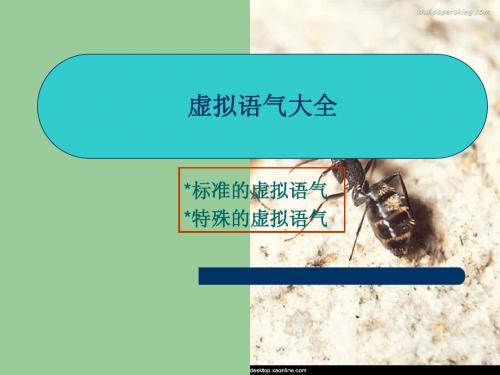虚拟语气
- 格式:docx
- 大小:13.94 KB
- 文档页数:4

虚拟语气的常见用法和形式虚拟语气是用来表达非真实、未实现或假设情况的一种语法形式。
在中文和英语中都存在虚拟语气,但在两种语言中的使用方式和形式略有不同。
本文将介绍虚拟语气在英语中的常见用法和形式。
一、陈述虚拟语气1. 表达过去的虚拟虚拟语气的过去形式常用于表示与现实情况相反的假设或可能性,常用动词包括"be"、"have"、"were"等。
例如:- If I were you, I would apologize to her.- I wish I had studied harder for the exam.2. 表达现在的虚拟现在虚拟语气用于表达与现实情况相反或不确定的假设,常用动词包括"be"、"suggest"、"recommend"等。
例如:- It's about time she got a promotion.- I suggest that he be more careful next time.3. 表达将来的虚拟将来虚拟语气用于表达与现实情况相反或不可能实现的假设,常用动词包括"should"、"were to"等。
例如:- If I should win the lottery, I would buy a big house.- If it were to rain, the event would be canceled.二、命令虚拟语气当表示一种命令、建议或要求时,常使用虚拟语气来显得客气或委婉。
例如:- I suggest that you arrive on time for the meeting.- It's important that he be there for the ceremony.三、愿望虚拟语气愿望虚拟语气用于表达对过去、现在或将来的愿望、期望或希望。

虚拟语气用法归纳表格1、虚拟语气的定义虚拟语气是一种特殊的动词形式,表示说话人的主观愿望、假设、猜测、建议等非真实的情况。
11 与现在事实相反的虚拟语气条件从句:If +主语+动词过去式(be 动词用 were)主句:主语+ would/should/could/might +动词原形例如:If I were you, I would study harder111 与过去事实相反的虚拟语气条件从句:If +主语+ had +过去分词主句:主语+ would/should/could/might + have +过去分词例如:If I had known the truth, I wouldn't have made such a mistake 112 与将来事实相反的虚拟语气条件从句:If +主语+ were to +动词原形或 If +主语+ should +动词原形主句:主语+ would/should/could/might +动词原形例如:If it were to rain tomorrow, we would stay at home121 wish 后的宾语从句与现在事实相反:从句用一般过去时与过去事实相反:从句用过去完成时与将来事实相反:从句用 would/could +动词原形例如:I wish I were a bird (与现在事实相反)122 would rather 后的宾语从句与现在或将来事实相反:从句用一般过去时与过去事实相反:从句用过去完成时例如:I would rather you came tomorrow (与将来事实相反)13 虚拟语气在主语从句中的应用It is +形容词+ that 句型中,形容词为 necessary, important, strange 等时,从句用“should +动词原形”,should 可以省略。
例如:It is necessary that we (should) study hard14 虚拟语气在表语从句和同位语从句中的应用与主语从句类似,在 suggestion, proposal, order 等名词后的表语从句和同位语从句中,从句用“should +动词原形”,should 可以省略。




虚拟语气英语知识点总结一、虚拟语气的概念。
虚拟语气是一种特殊的动词形式,用来表示说话人所说的话不是一个事实,而是一种假设、愿望、怀疑、猜测或建议等。
二、虚拟语气在条件句中的用法。
1. 与现在事实相反的虚拟条件句。
- 结构:从句(If + 主语+ 动词的过去式(be动词一般用were)),主句(主语+ would/should/could/might+动词原形)。
- 例如:If I were you, I would study harder.(如果我是你,我会更努力学习。
实际上我不是你)2. 与过去事实相反的虚拟条件句。
- 结构:从句(If+主语+had+过去分词),主句(主语+would/should/could/might + have+过去分词)。
- 例如:If he had taken my advice, he would have passed the exam.(如果他听了我的建议,他就会通过考试了。
实际上他没听建议,也没通过考试)3. 与将来事实相反的虚拟条件句。
- 结构:从句(If+主语+动词的过去式/should+动词原形/were to+动词原形),主句(主语+would/should/could/might+动词原形)。
- 例如:If it rained tomorrow, we would stay at home.(如果明天下雨,我们就会待在家里。
明天是否下雨还不确定,但这是一种假设情况)- 或者If he should come tomorrow, I would tell him the news.(如果他明天来,我就会告诉他这个消息)- 以及If I were to see her tomorrow, I would give her the book.(如果我明天见到她,我就会把书给她)三、虚拟语气在宾语从句中的用法。
1. wish后的宾语从句。
- 表示与现在事实相反的愿望,从句谓语动词用过去式(be动词用were)。
虚拟语气总结虚拟语气是英语语法中的一种特殊语态,用来表达一种假设、愿望、建议、命令、怀疑或可能性的情态。
在句子中,虚拟语气主要通过动词的形态变化和句子结构来表示。
一、虚拟语气的形态变化:1. 过去虚拟语气:主要用于表示与事实相反的情况或不可能实现的愿望。
形式为:had + 过去分词。
例如:“If I had enough money, I would travel around the world.”2. 现在虚拟语气:主要用于表示与现在事实相反的情况或不可能实现的愿望。
形式为:动词原形+过去式。
例如:“If I were you, I would study harder.”3. 条件句中的虚拟语气:主要用于表示条件句中的假设情况。
形式为:should/would/could/might + 动词原形。
例如:“If it should rain tomorrow, we would stay at home.”二、虚拟语气的用法:1. 表达与现在事实相反的情况:使用“were”作为虚拟语气动词,无论主语是单数还是复数。
例如:“If I were you, I would apologize.”2. 表达与过去事实相反的情况:使用“had”作为虚拟语气动词。
例如:“If I had studied harder, I would have passed the exam.”3. 表达不可能实现的愿望:使用虚拟语气动词的适当形式来表示愿望、建议或命令。
例如:“I wish I were taller.” “If only I could speak French.” “She demanded that he leave immediately.”4. 表达估计、推测、怀疑或建议:使用虚拟语气动词的适当形式来表示可能性。
例如:“It is important that he arrive on time.” “She suggested that we go to the cinema.”三、虚拟语气的注意事项:1. 注意一致性:在条件从句中,主句和从句的动词形式要保持一致。
1,什么是虚拟语气
既然是“虚拟”,说明描述的这件事情未必发生或者几乎没有发生的可能性。
那么对现在、过去、将来的虚拟就分别表示描述的事情在现在、过去、将来未必发生或者几乎没有可能发生。
虚拟语气常见于条件状语从句、主语从句、宾语从句中。
2,虚拟语气的句式结构(动词的变形)
①,If条件状语从句中的虚拟语气
虚拟语气在含蓄条件句中的应用,可参照上表来处理。
做题时只需要将含蓄条件转化成if条件句即可。
例:Without your help,we couldn’t have finished the work ahead of time.
= But for your help, we couldn’t have finished the work ahead of time.
= If you had not helped us, we couldn’t have finished the work ahead of time. (对过去的虚拟)
②,wish后面的宾语从句中的虚拟语气
If only+句子=How I wish+ that从句
例:If only I were a bird. = How I wish that I were a bird.(对现在的虚拟)
③,would rather后面的宾语从句中的虚拟语气
④,as if/though从句中的虚拟语气
⑤,在坚持、命令、要求、建议的同根词下的虚拟语气用should+动词原型,且should可以省略。
此类词包括:
一坚持(insist);二命令(order,command);三要求(require,request,demand);四建议(advise,suggest,propose,recommend)以suggest为例:
I suggest that we (should) take a rest. (虚拟语气)
My suggestion is that we (should) take a rest. (虚拟语气)
It is suggested that we (should) take a rest. (虚拟语气)
注意:suggest作“表明;暗示”,insist作“坚持说”时,不用虚拟语气。
⑥,目的状语从句中的虚拟语气
在in case,for fear that,in order that,so that等引导的目的状语从句中,用“could/should/might/would + do”表示虚拟。
例:They left early for fear that they would miss the bus.
⑦,在It is (high) time (that)...句型中,that从句用should(不能省略)+do或did/were表示虚拟。
It is (high) time that we should take an action.
It is (high) time that we took an action.。